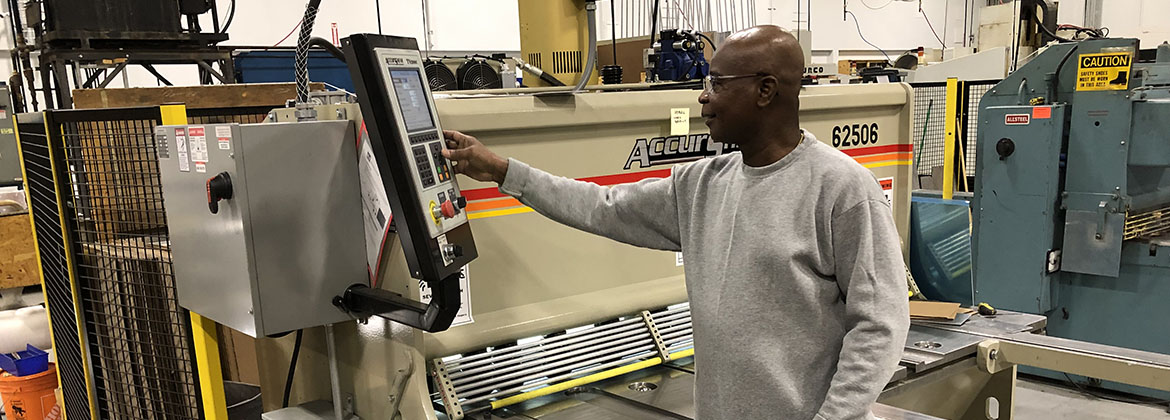Shimco innovates to seek new international markets
Wrickford Welcome, setting up the metal shear to cut blanks.
When Peter Voss met with Boeing, Airbus and other Shimco customers 10 years ago, their main concern was on-time delivery and top-notch quality. No longer.
“Those are just a given now; they don’t even want to discuss them anymore,” says Voss, president and CEO of Shimco, a company based in Cambridge, Ontario, that designs and manufactures precision parts for aviation companies around the world. “Now they want only suppliers that are innovative and growing, investing in people and technology, that sort of thing. They don’t want to partner with somebody that’s going to be outdated in five or 10 years.”
Shimco is a fine example of a Canadian manufacturer making the necessary—and sometimes painful—transition to the knowledge-based economy.
Instead of producing only structural parts, the company also develops sensors that collect, transmit and analyze data on the health of an aircraft’s structure. This data on wear-and-tear enables plane makers to streamline maintenance and repair processes. Shimco is also exploring a new way to protect aluminum from corrosion through a process known as anodizing. “We are working on developing the best form of anodizing in the world—a form that is benign both to humans and the environment,” says Voss.
Both the sensor and anodizing projects involve collaboration with universities, another hallmark of cutting-edge, knowledge-based Canadian businesses.
Making the transition is not always easy. As Voss puts it, “A lot of traditional businesses aren’t really geared to moving from manufacturing to more advanced technology. People get very comfortable. They’re making good money, they have a good lifestyle.”
One way that Shimco encourages its 37-strong workforce to adjust to new thinking is by hiring younger staff—who bring new ideas—and through quarterly updates on how the company is innovating.
“We just keep driving the philosophy that we are in a very competitive global market and we have to keep innovating and reinventing what we’re doing,” Voss says. “It’s almost like a collective attitude here. Everybody works towards the same goal.”
In another sign of its enterprising spirit, Shimco is eager to take advantage of recent trade pacts signed by Canada, notably the Comprehensive and Progressive Agreement for Trans-Pacific Partnership (CPTPP) and the Comprehensive Economic and Trade Agreement (CETA) with the European Union.
“We’re seeing a little more activity in Asia and Europe,” Voss notes. “But in our industry, it takes three to five years from first contact to delivery. It’s a pretty long process.”
Trade deals like the CPTPP and CETA often launch with a bang, but their enduring value to businesses like Shimco is the confidence they instill—the confidence needed to invest in and commit to new markets.
- Date modified:
